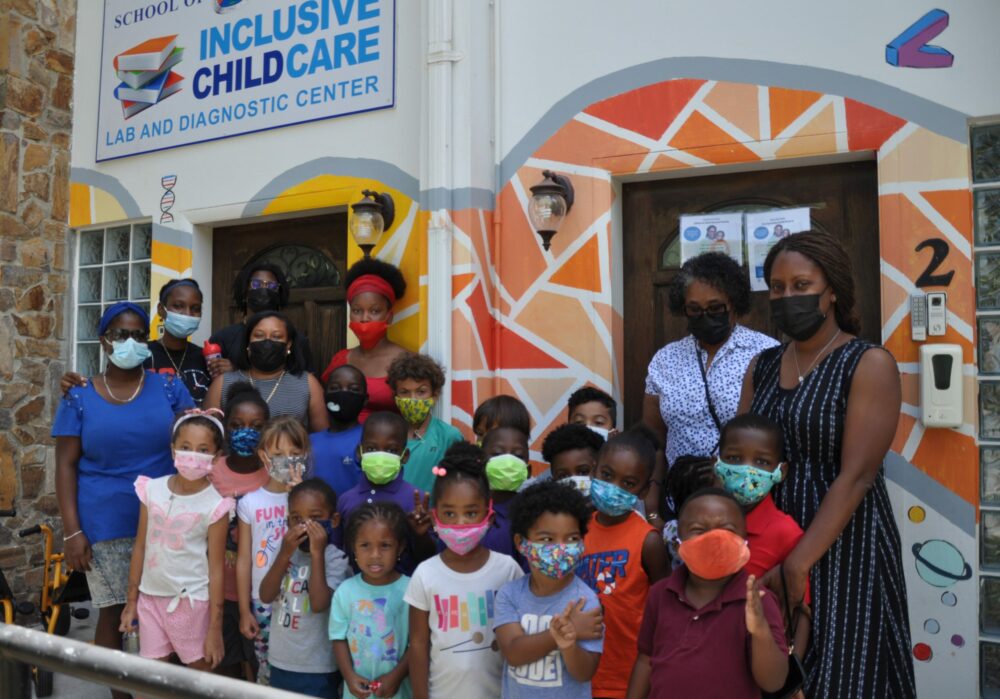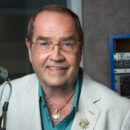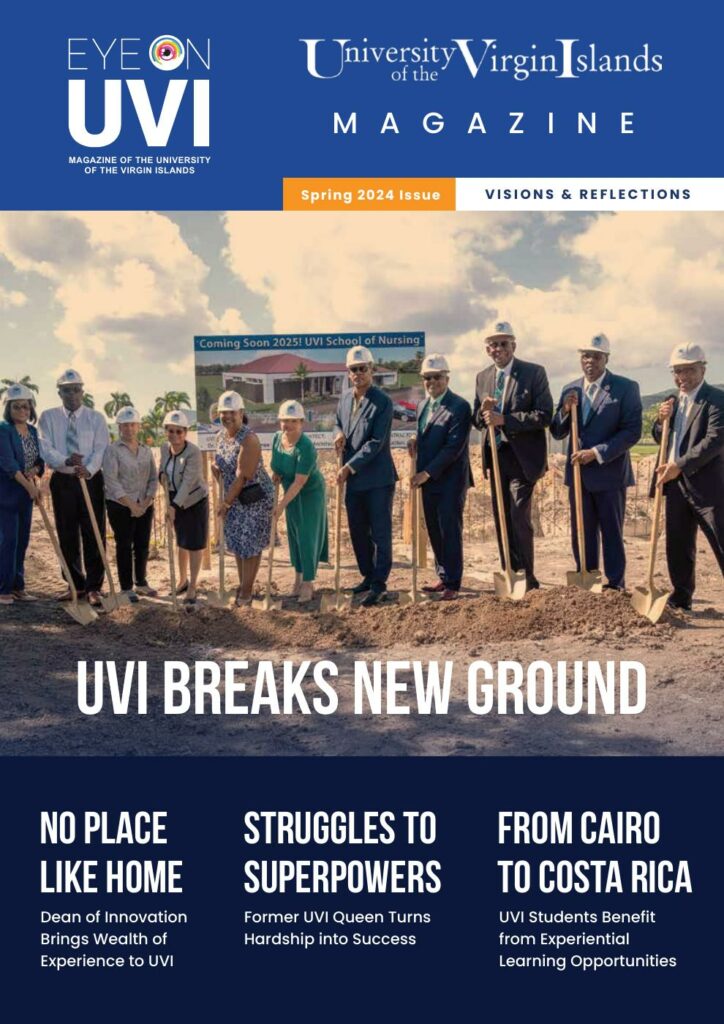Parents Delighted with Fun Enrichment Activities
Entering a new space can be daunting. Add new Covid-19 protocols to the mix and it can all be overwhelming, especially if you are a young child. “I was a little scared,” admits eight-year-old Harrison Brown, not knowing what to expect when he came to the center. Harrison was one of the first children to participate in the University of the Virgin Islands (UVI) School of Education’s Inclusive Childcare Lab and Diagnostic Center Summer Camp introduced this summer.
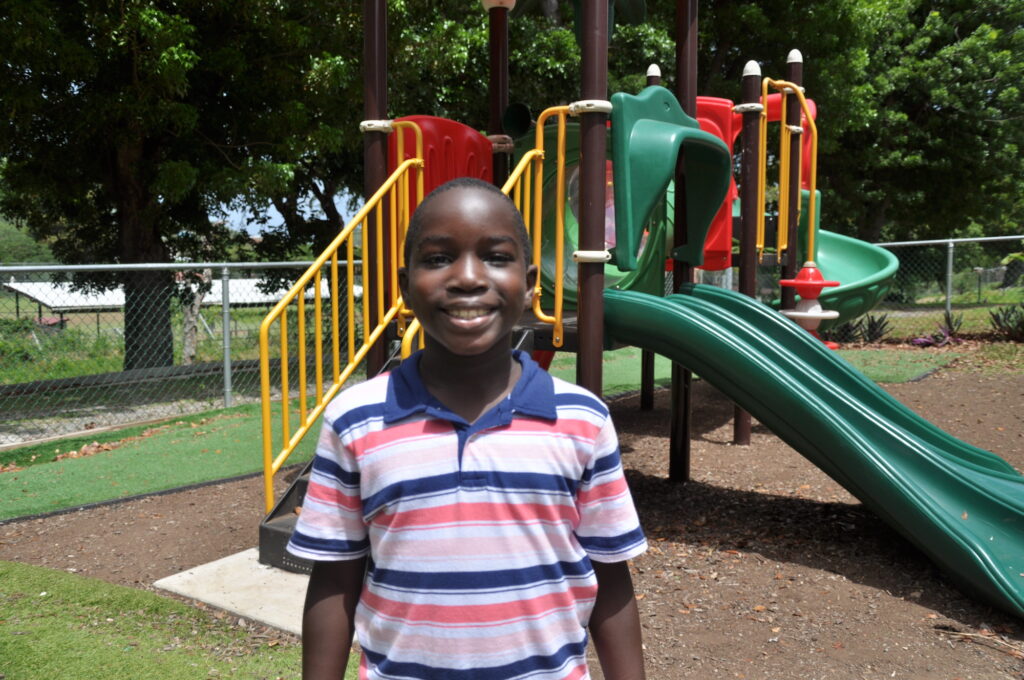
Approaching the center, what first catches your eye are the vibrant colors painted on the walls. Above, like clouds, large geometric shapes invite the wandering eyes of a child. Dancing all along the walls are science images – an atom, a lightbulb, parts of a cell, and a DNA structure. Math symbols – pi constant, square root, plus sign, a right angle hanging out in the corner of a triangle, and the neighboring circle with an unknown radius also decorate the walls. Already it is clear, this is not an average childcare center. After taking it all in you will notice the hand sanitizer mounted near the door. A cheery staff member takes your temperature before you are led further in. Downstairs, rooms are decorated with the names of campers and staff along with brightly colored posters that identify the reading nook and writing station. Upstairs are classrooms where the older campers conduct science experiments, learn computer coding, build robots, and create lava lamps.
“I really want to see the children of the Virgin Islands exposed to as much as possible. What we give you cannot get that anywhere else – quality experience at a very low cost.”
Director Sherryl Tonge-George
Located on the Orville E. Kean Campus on St. Thomas, the Inclusive Childcare Lab and Diagnostic Center was converted from a residence to provide solutions for several needs. It offers afterschool and childcare services for the UVI community and general public, training facilities for UVI School of Education students, and screening services for students with developmental delays or learning disabilities. The newest endeavor was a seven-week summer camp for children ages two to eleven years old, concentrating on science, technology, engineering, and math, (STEM) as well as the basics of tennis and soccer.
Funding for the summer camp was secured with a $25,000 grant that Sherryl Tonge-George, director of the UVI Inclusive Childcare Lab and Diagnostic Center acquired from the Community Foundation of the Virgin Islands. With those funds, the center was able to hire STEM teachers. The Virgin Islands Department of Education also provided the workers who facilitated with smaller learning groups. “All the students come together to do group activities, but they also split into smaller groups to focus on the science and math activities for the day, and when a child is missing a certain skill, we will work one-on-one to help develop that skill,” says Tonge-George.
“On the first day we made homemade snow,” exclaims Harrison. “I hope we are making robots this week because I am leaving for vacation and don’t want to miss it.” Safe to say all his first-day jitters melted away. His teachers Ms. Cherchaela Spellen and Mr. Isaiah Jarvis, impressed director Tonge-George in their interviews. Spellen, a UVI alumna, earned a Bachelor of Science in Biology, a master’s in social work from Boston College , and is currently working on her master’s in divinity at Oral Roberts University. “After my interview with Mrs. George, I found out that I would be teaching math and science, which are two of my favorite subjects,” shares Spellen.
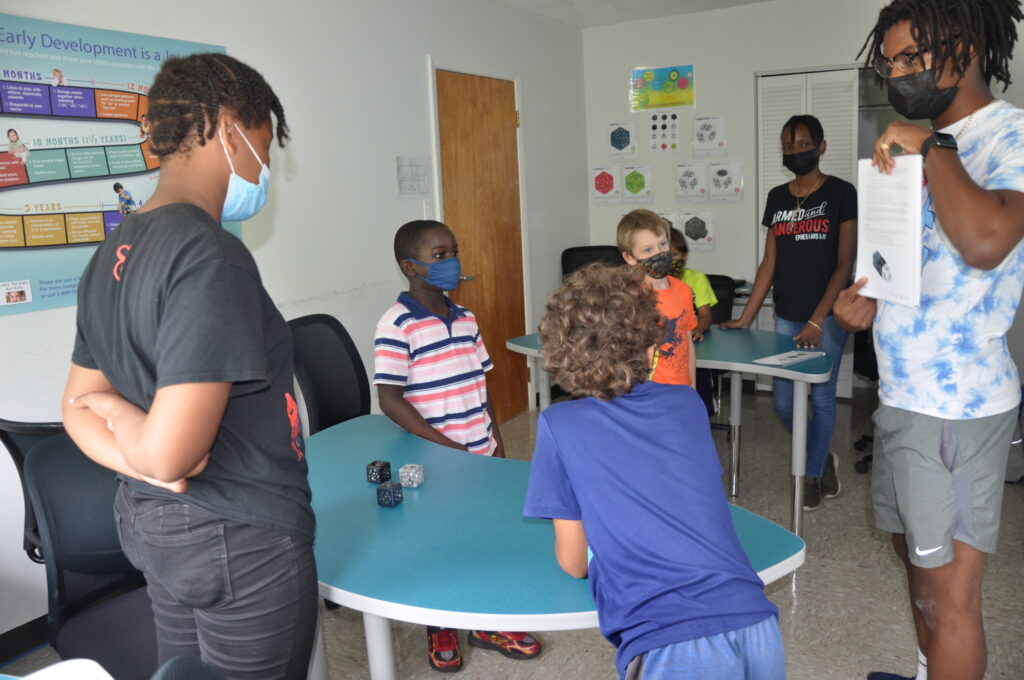
Spellen finds teaching children rewarding. As someone who loves to learn, the challenge of catering to each child’s learning style is welcomed. Spellen taught children to play steel pan and drums as a youth instructor at Trinity Music Academy. “It was similar to working here at UVI in terms of having to come up with creative and innovative ways to teach things to the youth understanding that not everyone learns the same way,” she said.
“Being around this group of students for these few weeks has allowed me to notice that for the most part, they are visual and hands-on learners,” says Mr. Isaiah Jarvis, a self-described hands-on learner. Jarvis is an 18-year-old sophomore attending Lynn University in Florida, pursuing a major in entrepreneurship and a minor in marketing.
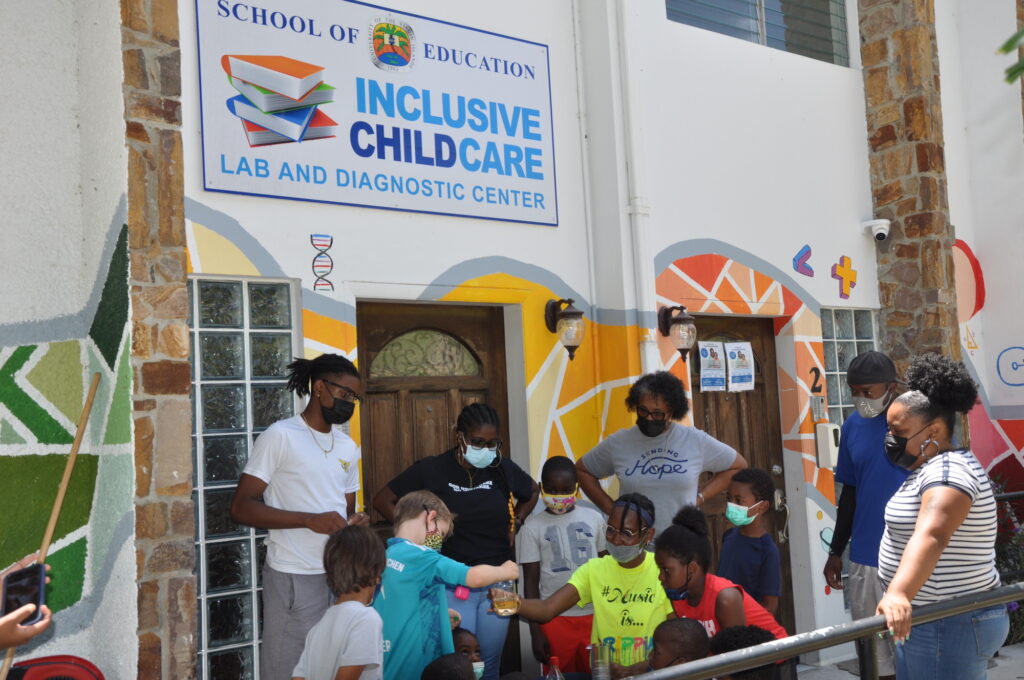
Jarvis also comes to the center with previous summer camp experience, leading athletics and outdoor activities at Vacation Bible School as well as volunteering at soccer camps. He is as agile in the classroom leading science activities as he is on the tennis court, a sport he has played since he was the campers’ age.
“In comparison to other camps that I have been a part of, this camp is well-structured and organized, a perfect balance between academics, athletics, and leisure time allows the students to remain involved throughout the day,” says Jarvis.
Tonge-George is on a mission to hire more young men. “We don’t see young men in early education, we don’t see young men in childcare and our boys need good role models,” she says. Coach Burt and Mr. Jarvis fit that bill.
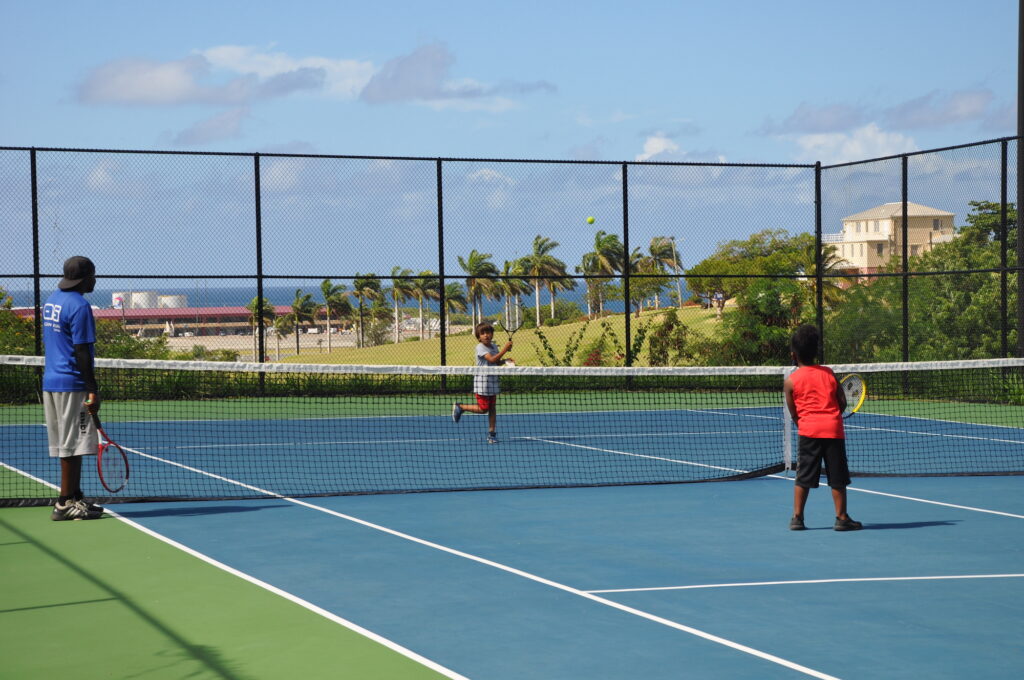
On days that the weather restricts the campers indoors, the teachers rely on technology. “Working with the iPads and Promethean board has been helpful because the technology allows us to reinforce concepts that are presented in class in a different form,” says Spellen. “There are many games, videos, and visual resources that are provided to the youth which they enjoy,” she concludes. “The iPads and Promethean board allow the students to remain engaged for a longer period of time,” adds Jarvis.
The iPads are lent out from the UVI library, with science and math programs downloaded for the campers. “We have enough that each group of ten children can be working on the iPad at the same time,” says Director Tonge-George.
When asked to describe a typical day Harrison shared, “When we get here, we do tennis, if it rains, we watch people rally [on the Promethean board].” Weather permitting, the day starts on the tennis courts with Mr. Burt and Mr. Jarvis for the older campers. Once they return to the center, it is time for a math lesson. After lunch, there is a half-hour of quiet reading and then a science lesson. The remainder of the afternoon is spent learning robotics and soccer.
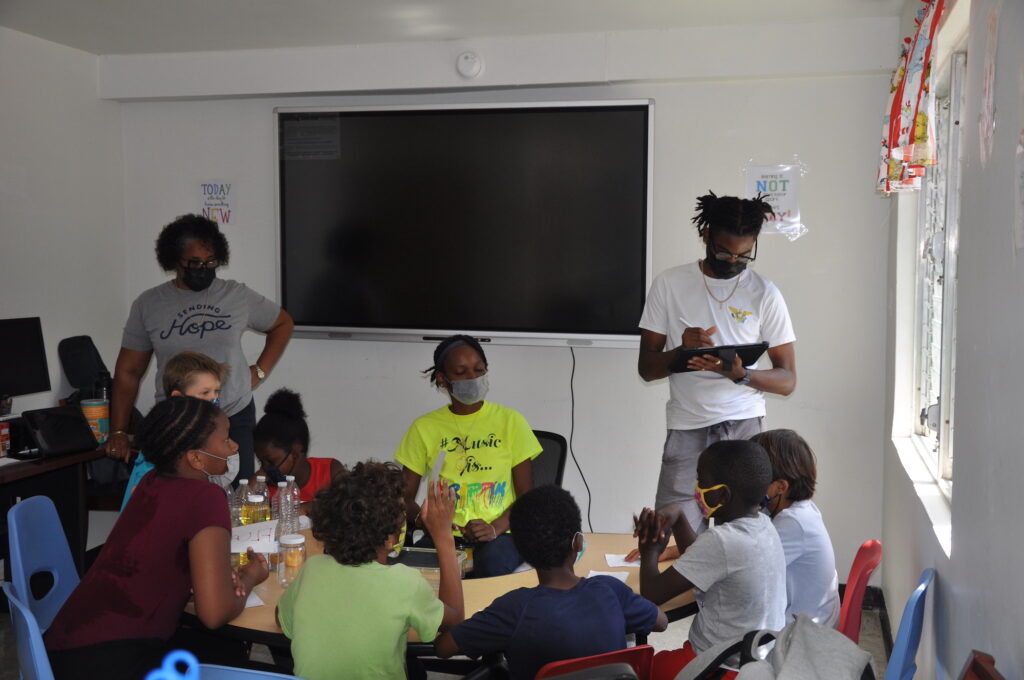
For the younger campers, the day starts with group circle time before math, then a special activity followed by tennis. After returning from the courts, it’s storytime, before lunch, then some quiet time followed by some time outside on the outdoor playground, and other activities before the parents arrive for pick-up.
“We just want the kids to have an experience that is out of this world and at the same time we want to have satisfied parents and so far, the parents are really happy with what the students are getting,” Tonge-George says.
One such parent is Andrew Joseph who wrote to director Tonge-George during the last week of camp. “I just wanted to express my pleasure of having my children enrolled in the summer program at UVI. My children had a great time. The staff were caring and professional. I appreciate the fact that my kids were exposed to so many different things, they got a chance to do STEM projects, play tennis, and learn things that will be valuable for this upcoming school year. Thank you for providing such an enriching program and I look forward to sending my children next year.”
There has been little need to advertise for the center, calls have already been coming in for the upcoming school year due to word of mouth according to Tonge-George. The preference is given to UVI students first, then UVI employees, followed by the greater community. “We are always going to have space for the UVI family,” promises Tonge-George. Especially if the child has needs other facilities are unable to accommodate.
“One student we referred was diagnosed with a developmental disability and is now receiving therapy here at the center,” shares Tonge-George. The center offers families access to speech and behavioral therapy three times a week.
“I really want to see the children of the Virgin Islands exposed to as much as possible. What we give you cannot get that anywhere else – quality experience at a very low cost,” pledges Tong-George. “Our goal is to have this as the model center for the Virgin Islands, we want to have people from other centers come in and see what we do.”
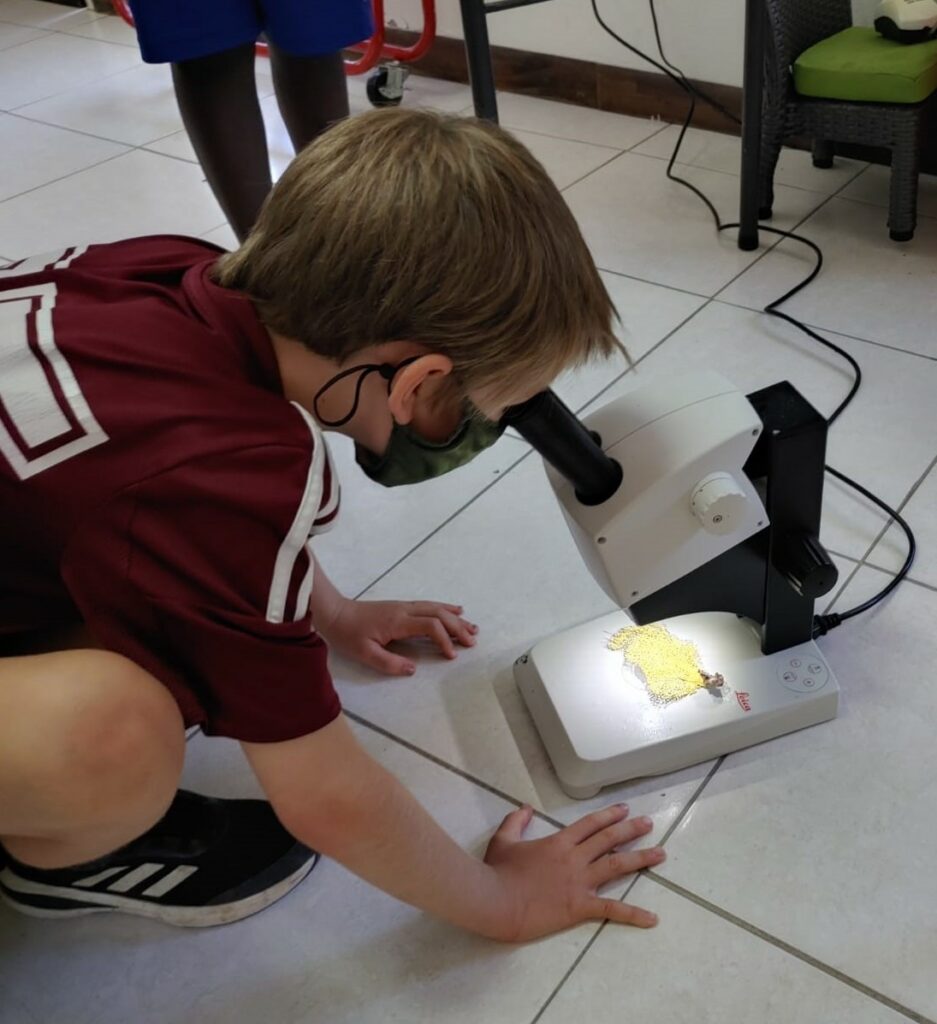
Tonge-George is committed to building an environment where, “from small, children learn that this person can be blind and still do what I can do and be my friend. I just want them to get that type of experience.”
The concept of inclusivity is not limited to the campers. “And it is the same for the pre-service teachers. They can come in and see all the things happening here,” says Tonge-George. The center serves as a centralized location for aspiring teachers and current educational professionals as the upstairs classroom will be utilized as a site for aspiring teachers to teach while being observed by their instructors and for completing their practicums. Furthermore, these future teachers have the opportunity to observe ongoing therapy sessions and teaching provided to students with autism, down syndrome and the visually impaired.
During the August State of the University address, President Hall spoke of the soon to be opened child center on the Albert A. Sheen-St. Croix campus, “I encourage those on that campus to take a look at that facility and how impressive it is.” Both centers are funded by a Title III federal grant from the U.S. Department of Education.

